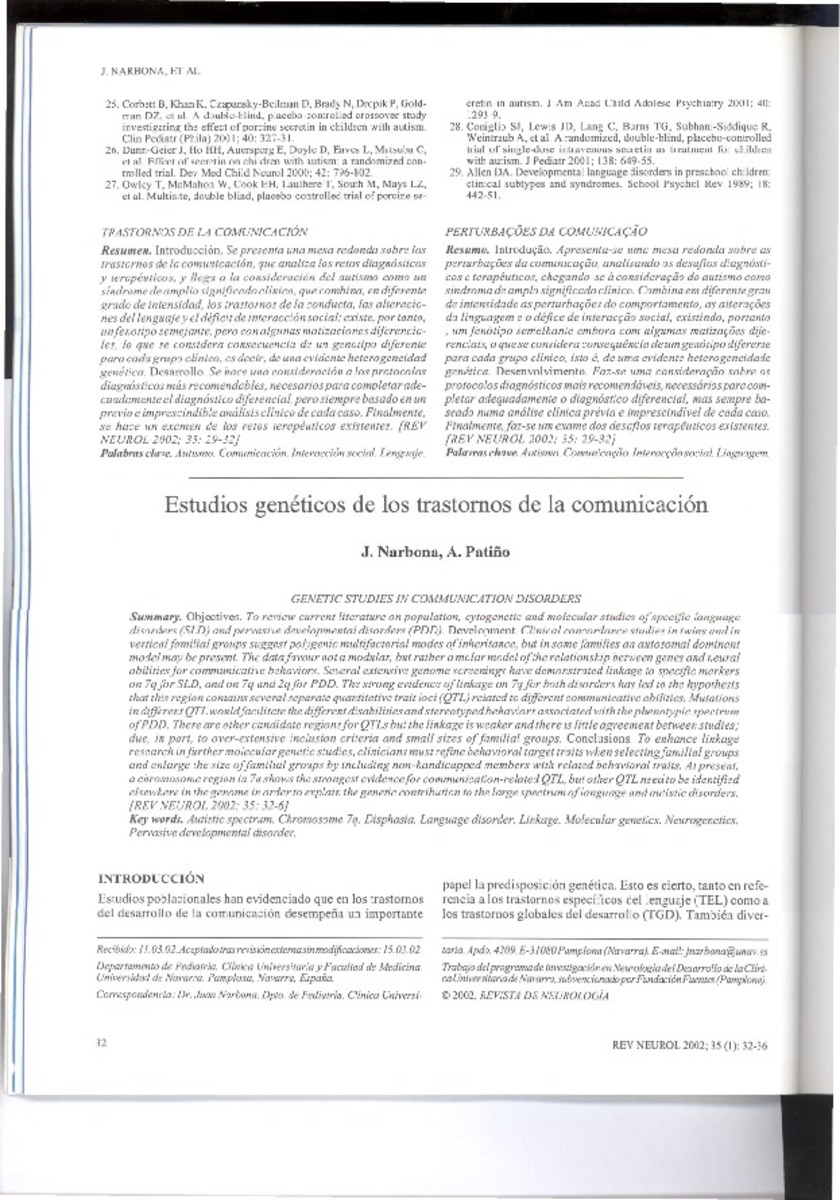Full metadata record
| DC Field | Value | Language |
|---|---|---|
| dc.creator | Narbona, J. (Juan) | - |
| dc.creator | Patiño-García, A. (Ana) | - |
| dc.date.accessioned | 2012-06-19T13:07:42Z | - |
| dc.date.available | 2012-06-19T13:07:42Z | - |
| dc.date.issued | 2002 | - |
| dc.identifier.citation | Narbona J, Patino A. Estudios genéticos de los trastornos de la comunicación. Rev Neurol 2002 Jul 1-15;35(1):32-36. | es_ES |
| dc.identifier.issn | 0210-0010 | - |
| dc.identifier.uri | https://hdl.handle.net/10171/22647 | - |
| dc.description.abstract | To review current literature on population, cytogenetic and molecular studies of specific language disorders (SLD) and pervasive developmental disorders (PDD). DEVELOPMENT: Clinical concordance studies in twins and in vertical familial groups suggest polygenic multifactorial modes of inheritance, but in some families an autosomal dominant model may be present. The data favour not a modular, but rather a molar model of the relationship between genes and neural abilities for communicative behaviors. Several extensive genome screenings have demonstrated linkage to specific markers on 7q for SLD, and on 7q and 2q for PDD. The strong evidence of linkage on 7q for both disorders has led to the hypothesis that this region contains several separate quantitative trait loci (QTL) related to different communicative abilities. Mutations in different QTL would facilitate the different disabilities and stereotyped behaviors associated with the phenotypic spectrum of PDD. There are other candidate regions for QTLs but the linkage is weaker and there is little agreement between studies; due, in part, to over extensive inclusion criteria and small sizes of familial groups. CONCLUSIONS: To enhance linkage research in further molecular genetic studies, clinicians must refine behavioral target traits when selecting familial groups and enlarge the size of familial groups by including non handicapped members with related behavioral traits. At present, a chromosome region in 7q shows the strongest evidence for communication related QTL, but other QTL need to be identified elsewhere in the genome in order to explain the genetic contribution to the large spectrum of language and autistic disorders. | es_ES |
| dc.language.iso | spa | es_ES |
| dc.publisher | Viguera Editores | es_ES |
| dc.rights | info:eu-repo/semantics/openAccess | es_ES |
| dc.subject | Autistic Disorder/genetics | es_ES |
| dc.subject | Communication Disorders/epidemiology/genetics | es_ES |
| dc.subject | Genetic Linkage | es_ES |
| dc.subject | Autismo | es_ES |
| dc.subject | Comunicación | es_ES |
| dc.subject | Genética | es_ES |
| dc.title | Estudios genéticos de los trastornos de la comunicación | es_ES |
| dc.title.alternative | Genetic studies in communication disorders | es_ES |
| dc.type | info:eu-repo/semantics/article | es_ES |
| dc.relation.publisherversion | http://www.revneurol.com/sec/resumen.php?or=pubmed&id=2002131 | es_ES |
| dc.type.driver | info:eu-repo/semantics/article | es_ES |
Files in This Item:
Statistics and impact
Items in Dadun are protected by copyright, with all rights reserved, unless otherwise indicated.






